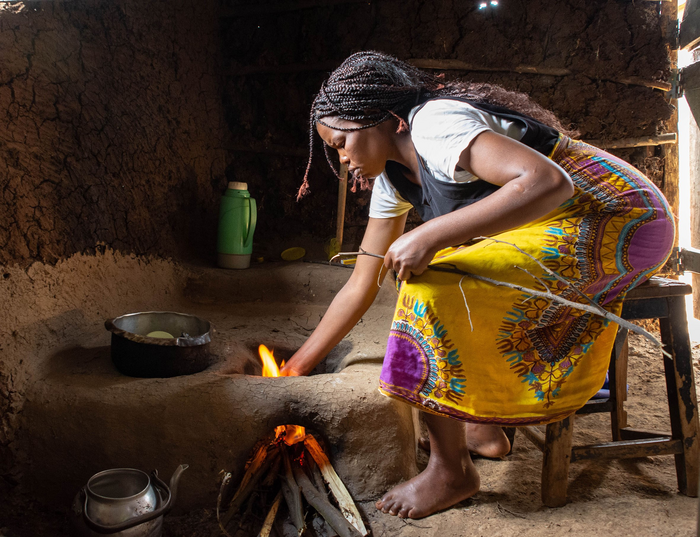A global health research team from the University of Liverpool has received £7 million from the National Institute for Health and Care Research (NIHR) to build on vital work to rapidly scale clean energy access to improve health, gender equality and climate in sub-Saharan Africa. The initiative will be co-directed by colleagues from the Kenya Medical Research Institute (KEMRI) with partners from Kenya, Cameroon, Tanzania, Uganda and Rwanda.

Credit: Nigel Bruce
A global health research team from the University of Liverpool has received £7 million from the National Institute for Health and Care Research (NIHR) to build on vital work to rapidly scale clean energy access to improve health, gender equality and climate in sub-Saharan Africa. The initiative will be co-directed by colleagues from the Kenya Medical Research Institute (KEMRI) with partners from Kenya, Cameroon, Tanzania, Uganda and Rwanda.
The NIHR Global Health Research Unit on CLEAN-Air (Africa) brings together experts from the UK and sub-Saharan Africa to address the substantial burden of disease from exposure to household air pollution. The 5-year programme of policy-oriented research and health systems strengthening is focused on informing national strategies to meet the UN Sustainable Development Goal (SDG) of ‘Universal access to affordable and clean energy’ (SDG7) that will improve health (SDG3), gender equality (SDG5), economic growth (SDG8) and climate (SDG13) by 2030.
Nearly half of the world, including 80% of sub-Saharan African populations, relies on polluting fuels such as wood, charcoal and kerosene for cooking. Research led by the University of Liverpool and international colleagues has shown that exposure to household air pollution from burning these fuels is one of the biggest risk factors for global disease, responsible for more than 2 million premature deaths annually.
The new funding follows on from previous NIHR funding of £2.5M for the CLEAN-Air(Africa) Global Health Research Group, which ran from 2018-2022 and aimed to address this public health catastrophe. Over the past four years CLEAN-Air(Africa) has shown significant health and gender equity gains that can be achieved by rapidity scaling adoption of liquefied petroleum gas (LPG) for cooking, with co-benefits for the environment from reductions in deforestation and pollutants from burning solid fuels.
The CLEAN-Air(Africa) Unit will expand its programme from Cameroon and Kenya to other East African countries with national targets to scale clean cooking under SDG7 including Tanzania, Uganda and Rwanda.
Plans include the establishment of an Air Pollution Centre of Excellence at KEMRI, housing state-of-the-art air monitoring equipment and training facilities that will enable academics, public and private sector organisations from Kenya and across Africa to conduct their own air quality monitoring and research.
With energy equity a priority for CLEAN-Air(Africa), addressing barriers to adoption of clean modern fuels for resource poor households is a key focus. Professor Daniel Pope, Director of CLEAN-Air(Africa) and Professor of Global Health at the University of Liverpool, explains: “We have partnered with ambitious commercial innovators in East Africa who are making clean cooking both accessible and affordable to the poorest populations. These companies use smart-meter technology allowing households to pay for cooking with LPG in small amounts. As the customer base is scaled in our East African focus countries, we will be identifying health, gender and climate gains from the transition to clean cooking.”
The Unit will build on the success of CLEAN-Air(Africa)’s community air pollution prevention program that was implemented across all 47 Kenyan counties. Dr James Mwitari, senior research fellow based at KEMRI and co-Director for CLEAN-Air(Africa) commented: “After effectively training community health workers in air pollution, health and prevention across Kenya we now plan to reach 130,000 community health workers to complete the training under Kenya’s Universal Health Coverage. The potential for primary and secondary prevention of household air pollution related disease at a community level is substantial and we have already seen examples of how lives have been saved through this education.”
As well as national rollout in Kenya, the program will be adapted for training community health workforces in Uganda, Rwanda and Cameroon under the Unit.
Dr Elisa Puzzolo, senior research fellow at University of Liverpool and co-Director for CLEAN-Air(Africa) added: “The SDG 7 target is likely to fall short in Africa based on the latest evidence. Our project will steer efforts to accelerate action and policy-commitment to address this gap and support vulnerable communities.”
The NIHR Global Health Research Unit on CLEAN-Air (Africa) involves research partners from the UK (University of Liverpool), Kenya (Kenya Medical Research Institute and Moi University), Tanzania (University of Dar es Salaam), Uganda (Makerere University Lung Institute), Rwanda (Rwanda Biomedical Center and Eagle Research Center) and Cameroon (Douala General Hospital).
CLEAN-Air(Africa) is one of ten new NIHR Global Health Research Units awarded funding to deliver high-quality applied global health research and training in sub-Saharan Africa over the next five years. The awards are funded through Official Development Assistance (ODA) from the UK aid budget.
For more information please visit: https://www.cleanairafrica.com/




